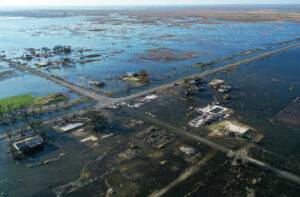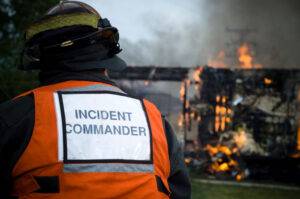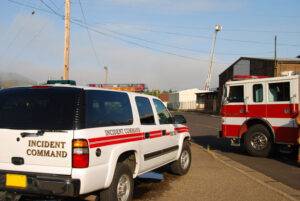
The appearance of U.S. Department of Defense (DoD) visual information does not imply or constitute DoD endorsement.
As a member of the American military, homeland security is already your business. Emergency management? Well, that’s something you try to make the enemy’s business. But there’s no question that adaptability, thinking on your feet, and preparedness are things that every service member learns on the job.
As the nation found out on September 11, 2001, however, homeland security is no longer exclusively the domain of the military. It’s not even just up to federal agencies.
Emergency situations stemming from natural and man-made catastrophe can land right on the doorstep of any city, county, or state in an instant.
Even big business must be ready for the next threat. Making plans and being ready to execute them isn’t just a job for the military today: governments and corporations of all sizes need that expertise.
Explore Your Military Training and Degree Options
Homeland Security Has Evolved to Include an All-Hazards Approach to Protecting People and Infrastructure
Although homeland security started off describing efforts to prepare for and harden against attacks, the term has changed over time. Today, homeland security and emergency management are interdisciplinary, taking a comprehensive, all-hazards approach to disaster preparedness and response… whether natural or man-made.
The American military is and always has been an important part of the tools our country relies on when threats rise, from wildfires to biowarfare. With the generous education benefits you receive as both a service member and a veteran, you can stack a degree in homeland security and emergency management on top of your military training and step right into civilian roles that continue your service to your country.
Homeland Security and Emergency Management Includes an Array of Specialized Jobs
 Just about every level of government in every state, county, or town has someone who is responsible for thinking about things that might go wrong in the event of natural and man-made disasters and taking steps to reduce the likelihood of devastating events. Other specialized jobs exist to respond to the situation and mitigate the effects after disasters occur.
Just about every level of government in every state, county, or town has someone who is responsible for thinking about things that might go wrong in the event of natural and man-made disasters and taking steps to reduce the likelihood of devastating events. Other specialized jobs exist to respond to the situation and mitigate the effects after disasters occur.
That means there’s no shortage of career paths where a homeland security and emergency management degree will offer precisely the right kind of preparation.
These jobs typically involve such tasks as:
- Disaster planning - Creating and updating plans for handling any kind of major natural or man-made catastrophe.
- Public safety policy advising - Providing input to managers and elected officials responsible for setting security policy.
- Intelligence review and assessment - Keeping up-to-date with the latest threats.
- Coordination with both public and private entities - Ensuring that agencies of all sizes are on the same page and that private organizations like the Red Cross or major area employers are in the loop and part of the effort.
- Emergency response management - Managing the disaster response in the event of a homeland security emergency.
The larger the region you are responsible for, the more focus you will find in these jobs. In a small town, the police or fire chief may be the de facto emergency manager. Major metro areas and big federal agencies have many emergency managers and homeland security directors, with their own departments and sub-specialties.
A degree in the field combined with your military background can serve as solid preparation for a career in any of those roles.
The Salary You Can Expect From a Position in Homeland Security and Emergency Management
 The salaries you will find in homeland security and emergency management fields will vary as widely as the kind of organizations where they are employed.
The salaries you will find in homeland security and emergency management fields will vary as widely as the kind of organizations where they are employed.
According to the Bureau of Labor Statistics, in 2021 the median salary for emergency management directors was $76,730.
But that number can swing much higher in industries where emergency management is in high demand:
- Professional, scientific, and technical services - $125,930
- Hospitals - $94,310
- Colleges, universities, and professional schools - $79,720
- Local government - $75,670
- State government - $69,450
The top ten percent of emergency management directors made more than $133,580.
Of course, going all the way to the job of emergency management director can take years, and a high-level degree in homeland security and emergency management. Starting out on that path, you’re more likely to find entry-level work in roles that may include:
- Firefighter - $50,700
- Police and Detectives - $66,020
- Public Safety Telecommunication - $46,670
Homeland Security and Emergency Management Are All Part of a Day’s Work in Many Military Positions
 Clearly, then, military specialties in law enforcement and firefighting fields will be good training for homeland security and emergency management jobs. Every service has military occupational specialties (MOS) for law enforcement roles. All but Space Force and the Coast Guard also have dedicated firefighters. But all Coast Guardsmen and Navy ratings are well-trained in specialized shipboard firefighting skills, even where that job is not their primary MOS.
Clearly, then, military specialties in law enforcement and firefighting fields will be good training for homeland security and emergency management jobs. Every service has military occupational specialties (MOS) for law enforcement roles. All but Space Force and the Coast Guard also have dedicated firefighters. But all Coast Guardsmen and Navy ratings are well-trained in specialized shipboard firefighting skills, even where that job is not their primary MOS.
An intelligence background is another good way to prepare for careers in homeland security, providing plenty of specialized training in developing intelligence and assessing threats. That’s also a big part of the job in civilian homeland security roles.
Other military jobs that can get you trained up in emergency preparedness can be found in civil affairs. Civil affairs specialists are the members of the military whose job it is to coordinate with local governments and civilian disaster aid organizations to prepare for and respond to major emergencies. Civil affairs jobs give you a chance both to network with current homeland security organizations and to learn all the ins and outs of their disaster planning and responses.
Many public safety agencies that hire homeland security and emergency management directors have points systems that recognize military training and experience to up your chances of getting hired.
The National Guard and Reserves Regularly Take Part in Emergency Management and Homeland Security Work
While there are many careers where active duty service offers the best path to training and experience in the field, homeland security and emergency management is one area where serving in the National Guard or Reserves might actually have the most opportunities.
That’s because the Guard is already a big part of every state’s emergency management and national disaster response plans. When terrorists attack or civil unrest occurs, it’s Guardsmen who suit up and patrol the streets of our cities. When floods and hurricanes hit, National Guard helicopters are hovering overhead within hours to pluck people out of danger. And when fires ravage the West in the summer, Guard units turn in their rifles for shovels and dig miles of fireline between the flames and our towns.
So many Guard and Reserve officers and senior enlisted personnel get plenty of experience in both planning and actively working in disaster response over the years. They may even have the opportunity to earn a red card, the all-important Incident Qualification Card that serves as the entry point into the National Incident Management System (NIMS) that all emergency managers rely on.
Both the experience and the training that come along with these jobs as citizen-soldiers can far exceed the related work that active duty troops normally perform.
Getting Familiar With ICS in Homeland Security and Emergency Management Jobs
 The Incident Command System (ICS) is an organizational concept that standardizes emergency response command and control across disciplines and organizations.
The Incident Command System (ICS) is an organizational concept that standardizes emergency response command and control across disciplines and organizations.
Originating in the wildland fire community in California in the 1970s, it was a response to a series of catastrophic fires that multiple agencies attempted to fight but without coordination, communication, shared planning, or accountability.
ICS creates a scalable command and control system where fresh resources from any agency can plug in to a central organization. Park Service hotshots could serve under a local fire chief, supported by Forest Service tankers and supplied by state DNR trucks.
The system worked so well that it was adopted quickly at a national level, and then for incidents of all kinds — hazardous material spills, hostage crises, search and rescue operations, even cyberattacks. The U.S. Coast Guard was one of the first major federal agencies to adopt ICS.
But the basic ideas of a chain of command and a flexible task organization will be familiar to almost any military veteran. The Task Force/Task Group concept came right out of the Navy playbook. And the ideas of shared training and a fixed span of control are military concepts so ancient they go back before the American military was even created.
Degrees in Homeland Security and Emergency Management Build on Your Military Experience
Whether your service comes through the active duty force or the reserves, though, you’ll need to earn a college degree to really pursue a career in homeland security and emergency management.
Those degrees come at all levels of study in American colleges:
Associate degrees are two-year programs that offer a basic introduction to emergency management, and are primarily designed as transfer degrees to fulfill the first two years of a bachelor’s degree.
Bachelor’s degrees are the full four-year degrees that most employers consider essential even for entry-level emergency management work. By putting together general studies and liberal arts courses with specific security and emergency classes, you get a well-rounded education at this level.
Master’s degrees are two-year programs that narrow the focus of study to advanced subjects that qualify you for higher positions in the field.
Doctoral degrees, or PhD programs, take four years or more to complete, but offer the highest level of theoretical and research studies in the field. They are what you shoot for if you are aiming to become a professor or high-level think-tank researcher.
You will also find plenty of degree programs out there that are just in homeland security, or only in emergency management. It pays to look closely at the curriculum those degrees offer. Emergency management degrees have been around for a couple generations. When homeland security became a hot topic in the post-9/11 world, many of them expanded their focus, without necessarily changing the name.
The Curriculum in Homeland Security and Emergency Management Offers Theoretical and Practical Training
 Studies in homeland security and emergency management will vary depending on the electives you choose and any concentration you might focus on. You can use these opportunities to either dive more deeply into concepts and practices you learned in your job in the service, or to expand your knowledge into new areas.
Studies in homeland security and emergency management will vary depending on the electives you choose and any concentration you might focus on. You can use these opportunities to either dive more deeply into concepts and practices you learned in your job in the service, or to expand your knowledge into new areas.
But most degrees will include a core set of courses that go right to the heart of homeland security and emergency management jobs:
Emergency Management and Leadership – Even if you didn’t achieve high rank in the military, you came away with some leadership skills. The ability to take charge and keep cool in a crisis isn’t something you learn in a classroom. But these courses will help you with the theory and organization of emergency management, valuable skills to add to your training.
Terrorist Threats – Terrorist threats, both foreign and domestic, are some of the most critical issues facing homeland security professionals today. You’ll learn about their methods, motivations, and vulnerabilities in courses like these.
Communication – Communications are critical in an emergency, but that’s also when they are hardest to maintain. You’ll build on military training in clarity, brevity, and redundancy to learn how to get the message through when it matters most.
Disaster Planning – Plans will be old hat to anyone with a background in the armed forces. Here, you’ll take those skills and learn how they apply to developing contingencies for all kinds of homeland security hazards.
Security Practices – Homeland security is about more than just preparing for the worst—it’s also about building defenses against it. This means you will study how to harden your area of responsibility against attack and other preventable disasters to keep them from happening in the first place.
Technology – Like every other field, technology has revolutionized homeland security and emergency management. Courses in the latest GIS mapping systems, personnel tracking, communications, sensors, and other high-tech tools will equip you for using the latest breakthroughs to save lives.
Disaster Recovery – For many kinds of disasters, even the best mitigation only takes the edge off. Destruction is often inevitable. This means emergency managers also must have one eye on the prospects of recovery. These courses will look at issues related to restoring infrastructure, environment, and the economy in the wake of disaster.
It’s also quite common in this field to have practicum or internship opportunities built into degree programs. You will already have some practical experience through your time in the service, of course. But it’s valuable to spend time placed alongside working civilian emergency managers in various companies or agencies, getting a sense of how things are done in their world.
You may have some valuable ideas and experience of your own to offer in an emergency management internship. You’ll also certainly pick up some new concepts to add to your own toolbox.
Concentrations in Homeland Security and Emergency Management Tailor Your Degree to Your Career Goals
Many degrees in homeland security and emergency management come with concentrations that allow you to focus your studies in areas such as:
- Cybersecurity
- Emergency Medical Services
- Fire Science
- Law Enforcement
- Leadership
You can also find majors in criminal justice and public safety administration that have homeland security and emergency management as a concentration area. Depending on your own ideas for how you want to grow your career, it can make sense to pursue a degree with the emphasis flipped—you’ll still get much of the same kind of coursework.
Choosing the Right School for a Degree in Homeland Security and Emergency Management
 Homeland security and emergency management degrees can be found at all kinds of schools today. As a veteran, though, you don’t want to go to just any school. You will get the best results if you pick a college that is military-supportive.
Homeland security and emergency management degrees can be found at all kinds of schools today. As a veteran, though, you don’t want to go to just any school. You will get the best results if you pick a college that is military-supportive.
What exactly is a military-supportive university, though? There’s no official Pentagon or Department of Veterans Affairs definition for the term. And you’ll find that plenty of schools feel free to call themselves military friendly.
To cut to the heart of it, though, it means going the extra mile for veterans or even active duty service members who attend. That means not just accepting GI Bill® benefits, but also offering:
- Full tuition and fee coverage at any public university’s in-state rates
- Housing allowance at an E-5 equivalent rate
- A regular stipend for books and supplies
- Potentially relocation expense coverage
With 36 months of those benefits, assuming you completed your service obligations, that’s enough to land you a full bachelor’s degree.
But genuinely military-supportive universities go much further. They’ll offer features and services that genuinely contribute to your education, things like:
Participation in the Yellow Ribbon program. Yellow Ribbon is a VA partnership where schools agree to contribute to tuition costs over and above what the GI Bill® covers, such as private school rates of out-of-state tuition. Any school that puts up money to help vets afford an elite education is definitely military-supportive.
Staffing dedicated advising and counseling services for vets. Academic advisors who can help you make the most of all the other benefits offered both by your school and the VA are a force multiplier that every veteran can use.
Offering early admissions and enrollment policies. Thirty-six months of benefits is a lot, but if you get jammed up with time expiring and only one class left to graduate that you can’t get into, these policies will really save your bacon.
Awarding credits for service training and experience. The military has a lot of superb training schools. Colleges that recognize the expertise you have developed there in homeland security and emergency management and award credit for it are truly military friendly.
You’ll also tend to find more veterans and more military-supportive schools. And that makes it more likely they’ll have veterans groups and other activities and support coming from people who understand where you’ve been.
You’ll find all this information and more through the VA’s GI Bill® Comparison Tool on their website. With searches by name or area, it will break down all your benefits and school information so you can make quick decisions and narrow your focus fast.
You Get More From the Military Than Just Homeland Security Training
 Why is it so important to have people around you who understand where you are coming from as a military veteran? In part, it’s because your service will have changed you. And we’re not just talking about the haircut.
Why is it so important to have people around you who understand where you are coming from as a military veteran? In part, it’s because your service will have changed you. And we’re not just talking about the haircut.
It started in bootcamp. You had new values drilled into you, important ones, like:
- Honesty and integrity
- Teamwork
- Timeliness and responsibility
- Grit and determination
If you don’t think that employers of all types, particularly those in homeland security, value those qualities, think again. That history of service could count for a lot in your job search.
2021 US Bureau of Labor Statistics salary and employment figures for Public Safety Telecommunicators, Emergency Management Directors, Firefighters, and Police and Detectives reflect national data, not school-specific information. Conditions in your area may vary. Data accessed June 2022.






